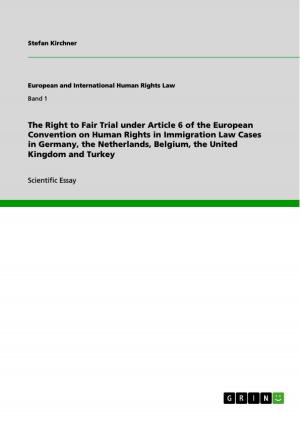Decentralisation within the EU: Committee of the Regions - an undemocratic talking workshop?
an undemocratic talking workshop?
Nonfiction, Social & Cultural Studies, Political Science| Author: | Oliver Hedderich | ISBN: | 9783638517751 |
| Publisher: | GRIN Publishing | Publication: | July 6, 2006 |
| Imprint: | GRIN Publishing | Language: | English |
| Author: | Oliver Hedderich |
| ISBN: | 9783638517751 |
| Publisher: | GRIN Publishing |
| Publication: | July 6, 2006 |
| Imprint: | GRIN Publishing |
| Language: | English |
Essay from the year 2003 in the subject Politics - International Politics - Topic: European Union, grade: 9 of 10, The Hague University (The Hague School of European Studies), course: European Regional Policy, 8 entries in the bibliography, language: English, abstract: The 222 members of the Committee of the Regions are not directly elected by the people. The Council3appoints them for a four year term on proposal of the member states.4Each member state itself decides how to chose the representatives in the CoR: Some of the countries, like Germany, Austria and, to a certain extend, Spain, leave this matter to the regions and the municipalities themselves.5One example, how the representatives can be elected, is to be seen in the German region (Land) Schleswig-Holstein. Like in every German Land, the Landtag, the directly elected regional parliament, decides about the representative in the CoR. In 2001, the members of the parliament voted for minister-president Heide Simonis.6So, the directly elected members of the parliament decided who should represent the people's interest on the European level. Indirectly, everybody had an influence on the decision by taking part on the regional election. On the other hand, in some states, like France and the United Kingdom, the national government decides about the members of the Committee of the Regions.7In the United Kingdom, the Foreign Office co-ordinates the list of its 24 full and alternate members in the Committee of the Regions. It is able to appoint members form the range of UK local authorities but also from the Scottish Parliament, the Northern Ireland and the Welsh Assembly.8 According to the rules of the CoR, the representatives send to the institution should reflect the political, geographical and regional/local balance in the respective member state.9Although e.g. the UK government says that the political and regional balance are considered when the members of the Committee are appointed10, the regions and municipalities do not have the power to decide on their own who should represent the region's interest on the European level. Their representative does not necessarily reflect the political colour of the majority in the region when the central government appoints the members of the CoR without having to consider the regions themselves.
Essay from the year 2003 in the subject Politics - International Politics - Topic: European Union, grade: 9 of 10, The Hague University (The Hague School of European Studies), course: European Regional Policy, 8 entries in the bibliography, language: English, abstract: The 222 members of the Committee of the Regions are not directly elected by the people. The Council3appoints them for a four year term on proposal of the member states.4Each member state itself decides how to chose the representatives in the CoR: Some of the countries, like Germany, Austria and, to a certain extend, Spain, leave this matter to the regions and the municipalities themselves.5One example, how the representatives can be elected, is to be seen in the German region (Land) Schleswig-Holstein. Like in every German Land, the Landtag, the directly elected regional parliament, decides about the representative in the CoR. In 2001, the members of the parliament voted for minister-president Heide Simonis.6So, the directly elected members of the parliament decided who should represent the people's interest on the European level. Indirectly, everybody had an influence on the decision by taking part on the regional election. On the other hand, in some states, like France and the United Kingdom, the national government decides about the members of the Committee of the Regions.7In the United Kingdom, the Foreign Office co-ordinates the list of its 24 full and alternate members in the Committee of the Regions. It is able to appoint members form the range of UK local authorities but also from the Scottish Parliament, the Northern Ireland and the Welsh Assembly.8 According to the rules of the CoR, the representatives send to the institution should reflect the political, geographical and regional/local balance in the respective member state.9Although e.g. the UK government says that the political and regional balance are considered when the members of the Committee are appointed10, the regions and municipalities do not have the power to decide on their own who should represent the region's interest on the European level. Their representative does not necessarily reflect the political colour of the majority in the region when the central government appoints the members of the CoR without having to consider the regions themselves.















